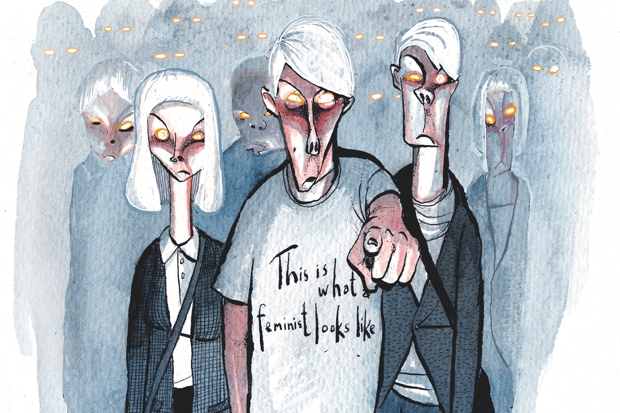‘Skins gambling,’ anyone? No, until yesterday, me neither. It’s nothing to do with strip poker or 70s bovver boys. It’s the name given to a completely unregulated gambling industry, aggressively promoted to teenagers and estimated to be worth multiple billions of pounds a year – yes, billions with a b.
One reason this isn’t a major scandal, I think, is that it will sound too far-fetched and too obscure and confusing to the sorts of people who we might hope would be scandalised into doing something about it. But so it was, too, with credit default swaps. So let’s try to explain. (I’m largely indebted for my own understanding to reading the investigative reporter Rob Davies, whose work on gambling is first rate.)
The websites where this gambling takes place are casinos in all but name. But instead of gambling cash in the hopes of making more cash, you gamble cash in the hopes of earning rare and valuable ‘skins’ for an online action game called Counter-Strike: Global Offensive. ‘Skins’ – originally meaning a customisable suit of pixels so your in-game character can look like the Joker, or Marge Simpson, or what have you – have come to be a metonym for all sorts of virtual in-game swag that can give a player bragging rights or a competitive edge: fancy guns, cool face-masks, unique hairdos.
The websites where this gambling takes place are casinos in all but name
I know, it’s mystifying, but gamers really dig this stuff; and by gamers, I mean your kids. The bleed-through between real-world and virtual economies has been going on for decades. Rare items of in-game loot are sometimes bought and sold for many thousands of real-world dollars. ‘Gold farms’ – factories where workers in the developing world play videogames all day to mine virtual resources for cash-rich, impatient westerners – are a weird but real thing, and have been for ages. (It has long tickled me that the World of Warcraft gold piece used to be worth about the same as a Russian rouble; it’s probably a bit more now.) Regulators already grapple with the possibility virtual economies can be used for money laundering or tax avoidance.
The value in these magic swords and custom skins is abstract and intangible; but no more abstract and intangible than the value created by the Nike swoosh on your trainers, the ‘aura’ of a unique configuration of paint on canvas, the bits and bytes of a streamed Taylor Swift song, or for that matter the ten-pound note in your pocket. All that is solid melts into air; that’s capitalism, baby. And videogames are the world’s most lucrative entertainment industry by far.
So, we’re talking about real money. Most CS:GO players cannot afford to pay hundreds of thousands for in-game loot. But as they watch YouTube videos or Twitch streams about their hobby, they will be funnelled to these skins-gambling websites. CS:GO content creators are paid very handsomely to promote them; about seven in ten streamers shill for the sites. There you can pay real money to open ‘loot-crates’ which have a chance of containing rare and desirable in-game goodies – and if you don’t snag the sniper rifle or what have you, are encouraged to keep trying again and again. So close! One more spin of the wheel?
There’s no reason we should give much of a hoot about this if it was adults at risk: a fool and his money are soon parted. But these websites, which are as I say casinos in all but name – they call themselves ‘trading platforms’ and ‘sweepstake sites’ even as they offer roulette wheels and pachinko – have no credible mechanisms for preventing under-eighteens accessing them, and require no licence to operate. The loophole that they have discovered, even as European governments are now lumbering in to try to regulate them, is that the UK government decided that since winnings aren’t paid out directly in cash, it doesn’t count as gambling.
That distinction is nonsense. Neurologically speaking, as I understand it, you’re getting the same effect from opening a loot-crate for a mystery prize as you are from spinning a roulette wheel or pulling the lever on a fruitie: the reward loop, with all that sweet, sweet dopamine, is what makes it so moreish, and why it’s so easy for gambling to become a problem. And you can cash out your winnings: any number of third-party websites will trade in-game loot for real-world money. These are casinos: it just happens they are using pixels as chips. A streamer who took a stand on this issue uncovered many, many players who had become addicted to these sites in their early teens.
I wonder whether the reason our government is reluctant to act, though, is because it wonders where we’re going to draw the line. These skins-gambling sites, which detach the loot-crate mechanism entirely from the context of the game, are blatantly online casinos and need to be regulated as such. The makers of Counter-Strike make it clear the game is 18+. But it is undoubtedly difficult to stop younger teenagers from playing it. And, when they do, is it okay that under-18s can pay real money for randomised loot-boxes in the first place? Hard to say no without sounding like a totalitarian; hard to say yes without sounding (if you don’t want teenagers skins-gambling on other sites) like a hypocrite.
It’s easy to say ‘down with this sort of thing’; harder to find a solution that isn’t heavy-handed
This isn’t even a fresh conundrum of the digital age: opening random loot-boxes in a FIFA game in the hopes of getting Harry Kane isn’t much different than the analogue Panini stickers of my own childhood; or even, more recently, Pokemon cards. These things have always generated lively secondary markets. And good luck taking RNG, or random number generation, out of videogames. The loot-box or gacha mechanism is central to any number of legitimate amusements. The smartphone games industry practically runs on it. ‘Just one more go’ is the gamer’s catchphrase no less than it is the problem gambler’s.
We might cast a jaundiced eye, too, over the way ‘gamification’ has spilt out into everyday life. All the world’s a casino. Pizza Express wants me to buy more pizzas to ‘level up’ to silver membership so I can access better rewards. Every Christmas, the Caffe Nero app wants me to shake my phone like a blithering idiot to open a loot-crate, sorry, virtual Christmas cracker, to see if I win a corny joke or some stamps towards a free cup of coffee. Duolingo rewards you for maintaining your ‘login streak’. I’m in no danger of coming away from Caffe Nero with a gambling addiction, but all these things are using, in milquetoast ways, the same psychological toolkit.
So it’s easy to say ‘down with this sort of thing’; harder to find a solution that isn’t heavy-handed and that hews to a simple principle. Maybe we muddle forwards, as we did with the problem of fixed-odds betting terminals, in recognising differences of degree rather than making grand statements about differences of kind. And maybe we hope for some buy-in from industry rather than shrieking for new laws and bannings. A good, instinctive, conservative fudge, in other words.
What if, for instance, we allowed ourselves to notice that almost all the problems with skins gambling centre on one game, CS:GO? Does that suggest that the manufacturer might be able to put its own house in order? The developers who run these game-worlds have God-like powers within them. Protecting their young playerbase is within their power.
Binding virtual loot to the user’s account or character so it can’t be traded (as other games do) eliminates the secondary market at a stroke, for instance. The game’s developers could continue selling loot crates in game – where they can control the price, put mechanisms in place to verify the age of the purchasers, and limit the rate at which players can buy them. And, yes, there’d no doubt be ingenious ways of circumventing these things. But, well, it’s worth taking a punt.
Got something to add? Join the discussion and comment below.
Get 10 issues for just $10
Subscribe to The Spectator Australia today for the next 10 magazine issues, plus full online access, for just $10.




















Comments
Don't miss out
Join the conversation with other Spectator Australia readers. Subscribe to leave a comment.
SUBSCRIBEAlready a subscriber? Log in